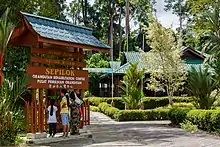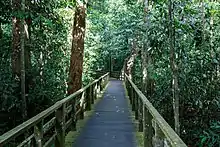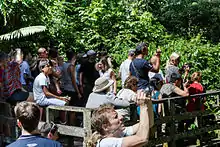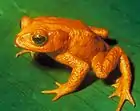Sepilok Orangutan Rehabilitation Centre
Sepilok Orangutan Rehabilitation Centre is located about 25 kilometres west of Sandakan in the state of Sabah, Malaysia.

The centre opened in 1964 as the first official orangutan rehabilitation project for rescued orphaned baby orangutans from logging sites, plantations, illegal hunting or kept as pets.[1] The orphaned orangutans are trained to survive again in the wild and are released as soon as they are ready. The centre has however attracted staunch criticism for its tourism activities and rehabilitation efficacy.[2][3][4] The sanctuary is located within the Kabili-Sepilok Forest Reserve which covers an area of 4,294 ha (10,610 acres), much of which is virgin rainforest.[5] Today around 60 to 80 orangutans are living free in the reserve.[6] It has become one of Sabah's tourist attractions,[7] despite the International Union for Conservation of Natures (IUCN) stating that tourism should not be allowed at orangutan rehabilitation centres.[2]
The activities of the centre have featured in television series including "Paul O'Grady's Animal Orphans"[8] and Animal Planet's "Meet the Orangutans".[9] "Meet the Orangutans" was criticized as a maleducative series[10]
In October 2014 the centre opened a new section where visitors can view the nursery area where the younger Orangutans first learn to be outside and play on a large climbing frame. This consists of 2 large indoor seating areas (one with air conditioning and one with fans only) with a large window that overlooks the play area. There is no additional charge to enter this part of the centre.
The Orangutan Rehabilitation Centre is neighboured to the Bornean Sun Bear Conservation Centre and shares veterinary facilities, personnel, parking, access roads and ticket gates.[11]

Entry Costs (Malaysian/ Non-Malaysian nationals):
Adult- RM5/ RM30
Child- RM2/ RM15
Ticket is valid for the day of purchase, so you can attend both feeding times on the same ticket.
Camera Cost: RM10
Opening hours: Saturday to Thursday- 9am to 12pm and 2pm to 4pm. Fridays 9am-11am and 2pm to 4pm.
Orangutan feeding times: 10am and 3pm. It is recommended to arrive 30 minutes before feeding time.

Facilities: Souvenir shop, information center showing a video 6 times a day, cafe and toilets.
Getting there: Many organised tours leave from around Sabah at varying prices. Public bus #14 departs from Sandakan taking approximately 45–60 minutes, costing RM5. The Kota Kinabalu to Sandakan bus can also drop you at junction Jalan Sepilok, around 2.5 km from the center. Journey approximately 6 hours from KK.
Taxis are usually available outside the centre (RM40 to Sandakan).
Criticism
The centre has been criticized for its tourism practices, including for not abiding by the International Union for Conservation of Nature's Best practice guidelines for great ape tourism.[2][12] In 2016 a tourist was injured in an attack by an orangutan at the centre.[13] In another attack in 2017 a female tourist at the centre was stripped almost naked.[14]
For over 15 years the centre accepted paying members of the public to take part in rehabilitation of orangutans at the centre, organised by British company Travellers Worldwide.[15] The practice gained widespread criticism[3][12] and has been labelled as exploitation[3] as rehabilitation of orangutans should be limited to a closed, qualified and stable group of people who always work with the same orangutans, ideally through their entire rehabilitation.[16]
Allegations of orangutans habituated to humans disappearing from the centre as a result of their continued harassment of tourists have been made.[17]
In a research published in 1999, Our Vanishing Relative, the centre was one of several labelled as a commercial venture exploiting wildlife and that it has become a serious liability to the survival of orangutans, rather than serving conservation.[18]
From 1996 the centre supplied orphan infant orangutans to a luxury resort five hours away. This was heavily criticized by an NGO which campaigned against this practice in 2015. The centre stopped the supply of infants to the resort in 2016.[19]
A study published in 2008 revealed that the infant orangutan death rate is higher at the SORC than in zoos. The authors of the study stated that the possible increase in disease transmission and aggression that resulted from frequent close encounters among orangutans gathered at the feeding platform at the SORC might be one reason for this high death rate.[20]
The Sabah Wildlife Department, the Sabah state government wildlife agency, were accused of not showing transparency on how two infant Sepilok orangutans became orphans, while funds were being raised for the infants.[21]
An orangutan was allegedly needlessly euthanized at the centre.[22]
In September 2020, the Sabah Wildlife Department was criticized for not being transparent about the fate and welfare of six orphaned Sepilok Orangutan Rehabilitation Centre orangutans.[10]
See also
- Among The Great Apes With Michelle Yeoh (Documentary about the Sepilok Orang Utan Sanctuary)
References
- Thompson, Shawn (2010). The Intimate Ape: Orangutans and the Secret Life of a Vanishing Species. Citadel Press. p. 54. ISBN 978-0-8065-3133-5.
- "Sepilok orangutan tourism – here's what's wrong – fotomalaysia.org". www.fotomalaysia.org. Retrieved 6 February 2020.
- "Tell Travellers Worldwide, stop exploiting Sepilok orangutans! – fotomalaysia.org". www.fotomalaysia.org. Retrieved 6 February 2020.
- Daud, Zulkifli (7 December 2019). "Sepilok centre must heed the rules". NST Online. Retrieved 6 February 2020.
- "Conservation Areas Information & Monitoring System - Kabili-Sepilok FR". Sabah Forestry Department. Retrieved 12 November 2007.
- "Sepilok Rehabilitation Centre - Orangutan Appeal UK". Retrieved 30 December 2011.
- "Sepilok Orang Utan Sanctuary". Tourism Malaysia. Retrieved 23 May 2014.
- Hiley, Robert (7 April 2016). "Paul O'Grady's Animal Orphans: It was love at first sight with Archie the orangutan | News | TV News | What's on TV". What' s on TV. Retrieved 19 December 2019.
- "About The Show - Meet the Orangutans". Animal Planet. Retrieved 19 December 2019.
- "No transparency from Sabah wildlife authorities on welfare concerns of six Sepilok orangutans". Friends of the Orangutans (Malaysia). 2 September 2020.
- BSBCC Website: Location Archived 29 July 2014 at the Wayback Machine; accessed 12 June 2014
- Colee, About the Author Shannon (21 November 2019). "A M'sian NGO claims that tourist volunteers in Sabah are bad for orangutan conservation". CILISOS - Current Issues Tambah Pedas!. Retrieved 6 February 2020.
- "Rogue Orangutan!!! - Review of Sepilok Orangutan Rehabilitation Centre, Sepilok, Malaysia". Tripadvisor. Retrieved 6 February 2020.
- "Orangutan attack! Be very careful here - Review of Sepilok Orangutan Rehabilitation Centre, Sepilok, Malaysia". Tripadvisor. Retrieved 6 February 2020.
- Friends of the Orangutans (6 July 2020). "General public finally barred from involvement with orangutan rehab at Sepilok". travellersworldwide.com. Retrieved 6 February 2020.
- Russon, Anne; Smith, Joshua; Adams, Laura (1 May 2016), Managing human-orangutan relationships in rehabilitation, ISBN 978-3-319-30467-0, retrieved 6 February 2020
- FMT (18 May 2016). "Orangutan death exposes malpractice at Sepilok". Free Malaysia Today. Retrieved 6 February 2020.
- Rijksen, Herman (1999). "Our Vanishing Relative". ResearchGate: 164.
- "Shangri-La's orang-utan rehab programme a travesty".
- Kuze, Noko (May 2008). "Reproductive parameters over a 37-year period of free-ranging female Borneo orangutans at Sepilok Orangutan Rehabilitation Centre". ResearchGate. 10.1007/s10329-008-0080-7.
- Friends of the Orangutans (14 October 2020). "What happened to the mothers of two orphaned Sepilok orangutans?".
- the Orangutans, Friends of. "Was an orangutan needlessly euthanised at Sepilok?".
External links
| Wikimedia Commons has media related to Sepilok Orangutan Rehabilitation Centre. |
| Wikivoyage has a travel guide for Sepilok Orang Utan Rehabilitation Centre. |
